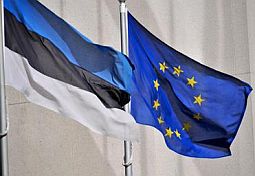Budget, Estonia, EU – Baltic States, Financial Services, Legislation, Markets and Companies, Transport
International Internet Magazine. Baltic States news & analytics
Thursday, 25.04.2024, 02:07
Estonia among greatest gainers in the EU’s new budget period
 Print version
Print version |
|---|
Estonia's share in the new budgetary framework is 5.89 billion euros, which makes the country one of the greatest net beneficiaries among the member states.
"In spite of the contraction of the total budget volume, Estonia can consider itself a clear winner in these talks," said Prime Minister Andrus Ansip after the talks, which lasted more than 24 hours.
Compared to the position coming out of the starting blocks – in the European Commission's November proposal – Estonia was one of the few member states that found its net position had improved. Estonia’s share in the new Multi-Annual Financial Framework is 5.89 billion euros, which is nearly 907 million euros more than it was in the 2007-2013 budget.
In accordance with the agreement, the outlook for the competitiveness of Baltic farmers will improve in the new budget period. The unequal treatment stemming from discrepancies in direct subsidies will decrease significantly.
"Although we did not succeed in eliminating the inequality completely, farmers have reason to cheer," said Ansip. The total direct subsidies amount will double and the support per hectare will reach 75% of the EU average by the end of the period. Ansip said that will mean at least 196 euros per hectare by 2020. Currently the assistance including top-ups from the state budget is 143 euros per hectare.
In addition, Estonia was able to keep the farmers' subsidy levels from temporarily dropping below the present amount. Compared to the November proposal, Estonia received an additional 50.7 million euros, which gives the Cabinet the possibility of increasing support for farmers to the Lithuania’s level in 2014 and 2015.
In spite of the common efforts of the Baltics, the cutback in the rural development assistance with respect to the previous period remained in force. In the next budgetary period, Estonia will receive 721 million euros in rural development assistance. EU assistance for Estonian agriculture grew 41%.
Considering the 2008 recession, Estonia, along with Latvia, Lithuania and Hungary, received an amount for investment that was larger than that of other Cohesion Policy countries. Estonia gained 350 million euros in additional funding from this exception.
A total of 23 billion euros was left in the Connecting Europe Facility (CEF) of which ten billion euros is for Cohesion Policy states. That means that the Rail Baltic project can go ahead. Prime Minister Ansip said the future Estonia will cease to be an island in the energy or logistics sense.
“Thanks to today's agreement, Rail Baltic is no longer just a theoretical dream but a real possibility,” said Ansip.
He said the question was only a matter of when the Baltics and Poland would be ready to start the project. The nearly 730-kilometre-long Rail Baltica would in future link Tallinn with Poland and Germany via Latvia and Lithuania.
The prime minister also said he was pleased that the CEF would allow gas and energy infrastructures to connect Estonia with the rest of Europe. Specifically, it will be possible to build a gas pipeline between Finland and Estonia and plan the region’s common natural gas terminal.
Regardless of the cuts to the EU budget, the amount of investments aimed at increasing the European Union’s competitiveness will grow 20%, including support for research and development.
The heads of government and state of the European Union member states went into negotiations yesterday evening and 24 hours later reached an agreement that satisfied all parties.








 «The Baltic Course» Is Sold and Stays in Business!
«The Baltic Course» Is Sold and Stays in Business!

